Realizing Children’s Rights in Nigeria
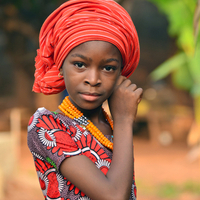
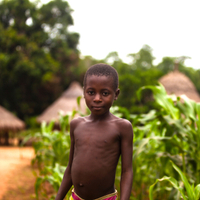
Nigeria is the most populous country in Africa, with over half the population being under the age of eighteen. Yet, the extraordinarily complex situations simultaneously taking place in Nigeria, coupled with a unique legal system, prevent the full realisation of children’s rights.

Children’s Rights Index: 4,89 / 10
Black level: Very serious situation
Population: 210 million
Pop. ages 0-14: 43.87%
Life expectancy: 61 years
Under-5 mortality rate: 120‰
Nigeria at a glance
The Federal Republic of Nigeria (Nigeria), also known as the “Giant of Africa”, is a West African country bordered by Niger, Chad, Cameroon and Benin. It enjoys direct access to the Atlantic Ocean on its southern border. Its nickname comes from the fact that Nigeria is the most populous country in Africa and ranks seventh in the world with over 210 million inhabitants. It also has the third-largest youth population in the world, with almost half the people being under the age of eighteen, thus making the realisation of children rights a crucial point.
Moreover, Nigeria has the largest economy in Africa and ranks in the first quarter in the world. Nigeria’s uniqueness is due to having over 250 ethnic groups living on its territory, speaking 500 distinct languages in total. British legacy and practical considerations have established English as the official language.
Nigeria gained its independence from the British empire in 1960. However, it experienced three years of civil war and several military dictatorships prior to becoming a stable democracy in 1999. Nigeria is a federal republic, functioning in a manner similar to the United States. The President exercises the executive powers and is both the head of the State, and of the federal government. From a legal perspective, Nigeria does not centre on one legal culture, but rather embraces multiple legal cultures, mainly depending on local states. Indeed, while common law is very present in Nigeria, civic law, customary law, and Sharia law are also present. This can lead to fluctuations, and sometimes conflicts in the enforcement of certain rights.
Currently, Nigeria is involved in two parallel non-international armed conflicts against non-state armed groups Boko Haram and the Islamic State in West Africa Province (ISWAP) (RULAC- Nigeria, 2021). Since January 2015, the Multinational Joint Task Force (MNTJF), composed of units from Nigeria, Niger, Chad, Cameroon, and Benin, has been supporting the Nigerian Government in the fight against Boko Haram.
Status of children’s rights[1]
At the international level, Nigeria has ratified the Convention on the Rights of the Child (CRC). Nigeria further ratified the Optional Protocol on the sale of children, child prostitution and child pornography in 2010, and the Optional Protocol on the involvement of children in armed conflict in 2012.
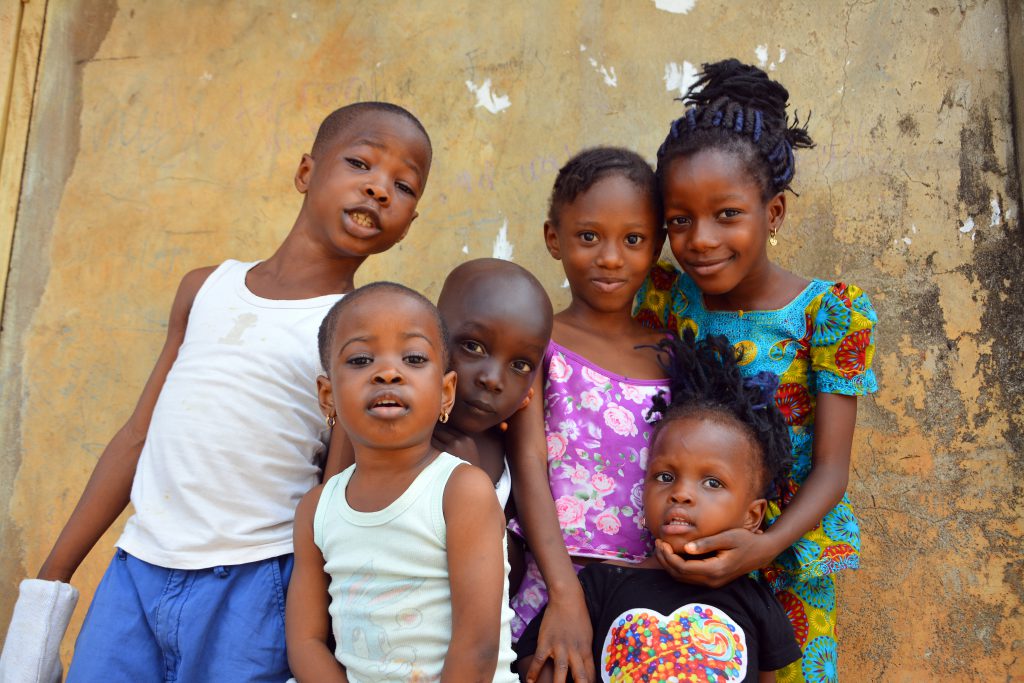
Regionally, Nigeria has ratified the African Charter on the Rights and Welfare of the Child (ACRWC). The ACRWC is the only regional instrument which focuses specifically on children and acknowledges the particular situation of most African children and the various factors limiting the full enjoyment of their rights (Preamble). Its aim was to complement the CRC by addressing issues specific to Africa and which were not included in the CRC (World Health Organization, African Charter on the Rights and Welfare of the Child, N/A).
Enacted in 2003, the Child’s Right Act (CRA) is the legal act by which Nigeria intends to incorporate the CRC and ACRWC at the national level. The National Human Rights Commission defines the CRA as the “law that guarantees the rights of all children in Nigeria,” children being any person under the age of 18. Aware of the challenges faced by children throughout the country, the National Human Rights Commission is in charge, at the federal level, of the implementation of the Act and undertakes “several procedures of promoting the rights of children, because they are vulnerable” (Commission, s.d.). Interestingly, the Commission considers the life of a child to start at the foetus stage, which remains a topic of international debate (Commission, s.d.). This can have a significant impact on abortion regulations and therefore must be kept in mind.
While the CRA gives life to international commitments regarding the rights of the child, its national implementation proves to be problematic. Organized as a federal system, laws do not immediately become enforceable in all 36 states forming Nigeria. Focusing on children, the Nigerian Constitution provides that children-related issues are the preserve of each constituent state. To this date, only 24 states have adopted, locally transcribed and implemented the CRA. This means that in the remaining twelve states, mainly located in the north of the country, the CRA has not been domesticated and thus is not enforceable.
Addressing the needs of children
Right to identity
The right to identity is the foundation of anyone’s rights, and impacts the growth and development of human beings. In its absence, a child becomes a non-legal person at the national level, and a stateless person at the international level. To prevent these dramatic situations, Article 7(1) of the CRC ensures the right to a name, a nationality, and, when possible, a family lineage. In other words, article 7(1) guarantees the right to identity. At the national level, the CRA does not explicitly consecrate a right to nationality.
However, Section 5 provides children’s right to a name, as well as the obligation to register every birth. The latter is made by reference to the Compulsory Registration Act (1992), which makes registration mandatory (Compulsory Registration Act n°69/1992, 1992). Considering the unique characteristics of the Nigerian legal system, this double guarantee of registration might just give better protection to children, where in a country of only one legal culture, it might be considered superfluous. Indeed, while 11 states have yet to ratify the CRA, some might have internalized the Registration Act, thus being obligated to implement the right of registration.
On the other hand, in Nigeria, citizenship is not given by birth. Section 25(1) of the Constitution conditions citizenship by birth to the Nigerian nationality of either the parents, or grandparents of the child. Therefore, while there is some protection and legal obligations, approximately 5 million births per year are unregistered (RC Changani, 2001). Lack of registration is mostly observable in rural areas, sometimes due to lack of facilities and means.
Right to education
At the forefront, the Nigerian Constitution explicitly recognizes the right to education (section 18, Chapter II). Yet, the status of this right is immediately limited by Section 6(6)(c) which makes Chapter II non-justiciable. All the rights enshrined in Chapter II have been qualified by a Nigerian high court as discretionary, which has led to critics arguing that such discretion leads to irresponsibility and corruption (Okeke, 2017).
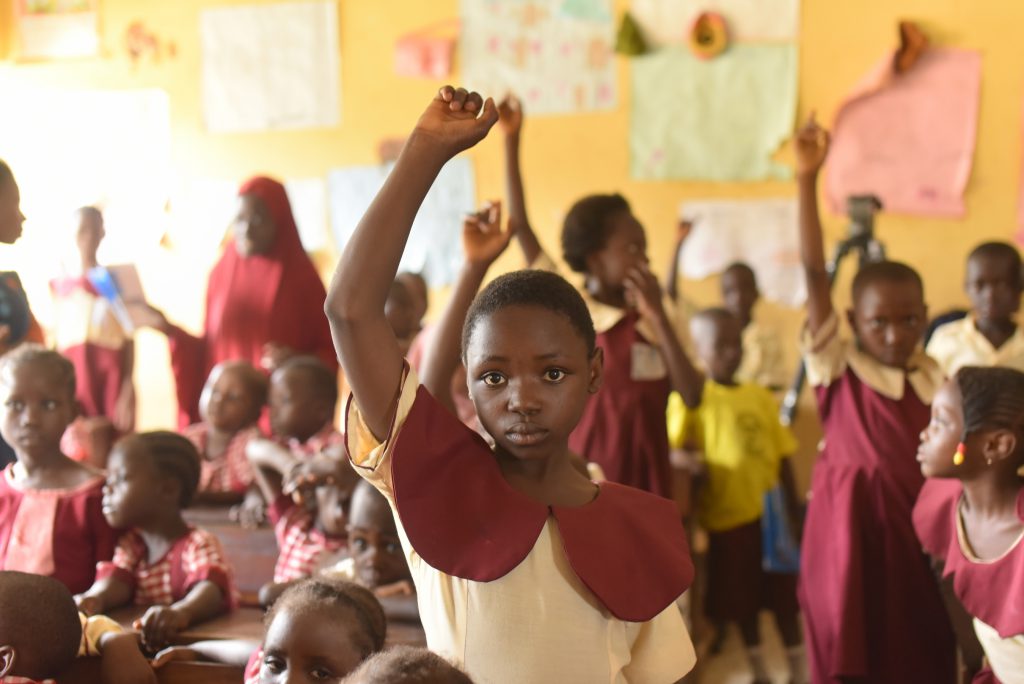
Still, at the federal level, the CRA provides that “every child has the right to free, compulsory and universal basic education,” which is the Government’s duty to provide (CRA, Section 15). To further support this right, the CRA also secures the right for pregnant children to return to their education after delivery and penalizes parents/guardians for failure to ensure that their children complete junior secondary education (CRA, Section 15(5)-(6)). The 2004 Compulsory, Free Universal Basic Education Act further secures the right to education of every child in Nigeria. Yet, one must not forget that these acts are only applicable to the extent that each federal state has ratified a law implementing the act, which is not the case throughout the country.
Right to health
The right to health in Nigeria is mentioned in the Constitution and in section 13 of the CRA. However, at the constitutional level, this “right” is not justiciable but merely represents a guiding principle. Starting from such a weak legal protection, some authors have reached the conclusion that access to medicine and healthcare is “illusory” (Oamen, 2020).
During colonial times, medical services were accessible in urban areas, while completely ignoring rural areas. Nowadays, decades after independence, this strict demarcation between urban and rural areas remains (Prof. GED. Omuta, 2018). Rural areas all over the country lack crucial access to healthcare facilities and services. While the overall situation in the country is beyond worrying, it would be erroneous to consider Nigeria to be a homogenous situation. Some states lead projects and programmes to improve the healthcare situation of their inhabitants.
For instance, the Delta state, located in the southern part of the country, has demonstrated efforts to improve the health situation, notably aiming to bridge the gap between rural and urban areas. Bearing this objective in mind, the Delta government has created numerous health facilities in rural areas. Yet, funding remains the main limit to adequate health facilities, with some centres still not able to properly examine pregnant women.
Because of this inadequate funding, some rural facilities still lack steady access to safe water and constant power (Prof. GED. Omuta, 2018). Despite limits, there are efforts towards improvement, including some youth-specific programs being developed (Nigeria Tribune, 2020).
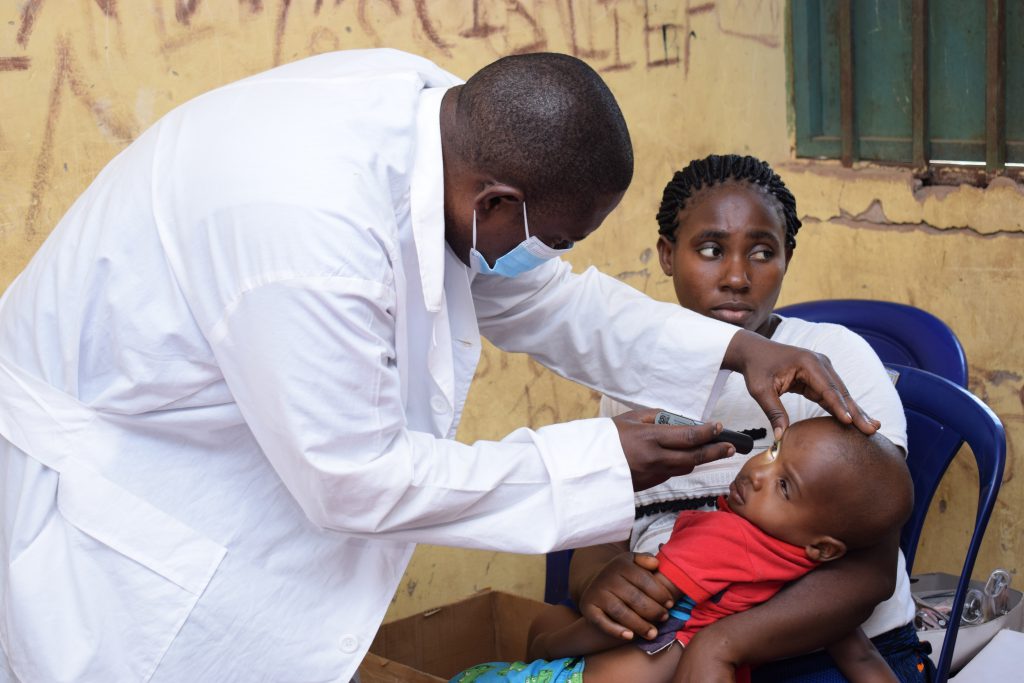
Healthcare in Nigeria is alarming. It has the world’s second highest number of deaths among children under five years old, with about 2,700 deaths daily. UNICEF further recalls that only one of three babies is born in a health facility. Vaccination is also an issue, as only 25% of children are fully vaccinated, this number decreasing to only 16% in rural areas. In addition, some infectious diseases have been returning in recent years: while Nigeria had been declared polio-free in 2015, new cases have re-emerged in 2016, maybe due to insecurity and public unrest in the northern states (UNICEF, 2017).
Other diseases, for which vaccines exist, remain a major public health concern in Nigeria. For example, Nigeria ranks fifth out of the 22 most-affected countries by tuberculosis. Finally, the WHO considers Malaria the most significant health problem in the country, and a cause of poor child development (World Health Organization, NIGERIA, 2020).
Nigeria has 190,950 HIV/AIDS infections per year, thus having the second-highest rate in the world (UNICEF, 2017). UNICEF estimates that three million people live with HIV in Nigeria. Many children are also affected by the illness, with around 260,000 of under 14-year-olds being HIV positive in 2015. Yet, children have extremely poor access to treatment (World Health Organization, NIGERIA, 2020), with only 17% of HIV-positive children having access to treatment (antiretroviral therapy).
Risk factors → Country-specific challenges
Child trafficking
The Nigerian Government, while demonstrating a will to end child trafficking, has still not met the international minimum standards for the elimination of trafficking (US Government, 2020). As such, it has been qualified as a Tier 2 Watch List by the United States. While they have passed several laws criminalizing various forms of trafficking and created a specific task force (the Edo State Task Force Against Human Trafficking), there has been no proper conviction. (US Government, 2020). In 2018, Nigeria ranked 32 out of 167 of the countries with the highest number of slaves (PathFinders Justice Initiative, 2020).
Child trafficking mainly takes place internally in Nigeria and takes various forms. Victims are often recruited from rural areas and then exploited for commercial sex and forced labour, for instance for domestic work in urban cities like Lagos, Ibadan, Kaduna, and Calabar (US Government, 2020). Young girls are also subjected to sexual trafficking and sent to foreign countries, such as France, Italy, Spain and Russia.
One particularly gruesome and alarming form of child trafficking consists of tricking young girls who are often in displaced camps in the north, to travel across the country, with the promise of a job. Upon their arrival, these young girls are detained, repeatedly raped, until they become pregnant and give birth. When lucky, after giving birth, the girls are kicked out of these “baby factories” and sent back to their initial location (US Government, 2020; Obaji, 2020). The babies are then sold illegally to adoptive families, forced into child labour, trafficked into prostitution, and sometimes ritually killed (Obaji, 2020). While the government is trying to combat this, the secrecy, lack of data, and status of victims (young girls, often orphaned, in displaced camps and rural areas) makes the task difficult.
Children in war
Armed conflict in Nigeria affects boys and girls differently. Internationally, Nigeria is known for the numerous kidnappings of young (Christian) schoolgirls by Boko Haram and other armed groups. One tragic event was the 2014 kidnapping of 276 schoolgirls, which started the online campaign #BringBackOurGirls. The girls were kidnapped while taking a school exam, which led to the closure of several schools in the northern part of the country, targeted by Boko Haram on a campaign opposing Western education (BBC, 2017).
Over a hundred of the girls were freed in 2016 and 2017, thanks to ICRC negotiations, likely in exchange of Boko Haram militants. In this specific kidnapping case, at least 113 girls have been left unaccounted for. Unfortunately, this is not an isolated event and there have been numerous and recurrent instances of such kidnappings which are still ongoing now (Jones, 2021). Thankfully, either due to complications or international negotiations, some of the young victims are sometimes released. Yet, their psychological damage is irreversible. Girls in armed groups have very limited roles and are mostly seen as objects: they are forced to get married, used for prostitution, or used as slaves in the camps.
According to UNICEF, more than 3500 young boys, mostly aged between 13 and 17 years old, have been used in the ongoing armed conflict in north-eastern Nigeria (Ajakaye, 3500 child soldiers recruited in Nigeria: UNICEF, 2019). In a 2020 United Nations report, it was confirmed that 596 boys had suffered from grave violations (UN Secretary General, 2020). children recruited by armed forces are often killed, maimed, or captured by State forces. In the latter case, the State has released several children from its custody, however, there is a lack of data to show how many still remain in state prison.
In the same UN report, the Secretary General expressed his concern and called upon the Nigerian Government to ensure respect for the rights of children in state detention (UN Secretary General, 2020). Finally, it must be noted that while it appears that the State (officially) stopped its use of child soldiers in its armed forces, no member of the armed forces or government official has been held criminally accountable for their recruitment and use of child soldiers (US Government, 2020). While it may no longer be systematic, there are still reports of children under the age of 15 being recruited into the armed forces (US Government, 2020).
Child marriage
Nigeria is home to 4.1 million child brides, the largest number in Africa (Adebowale, 2019). This number makes up 40% of all child brides in the West and Central Africa region (UNICEF, Child Marriage in West and Central Africa, 2018). This equals to almost 50% of Nigerian girls get married before their eighteenth birthday, and 16% get married before the age of 15 (Girls Not Brides, 2020). Poverty and the urban/rural divide also have an impact on child marriage practices.
According to UNICEF, 80% of young girls in the poorest quintile were married as child brides, compared to 10% in the richest quintile (UNICEF, Child Marriage in West and Central Africa, 2018). It must also be noted that child marriage sometimes involves young men below the age of 18, However, this percentage is low, 3%, thus the rest of this section will focus on child brides. (The Federal Republic of Nigeria, 2019).
Child marriage is driven by gender inequality and a belief in the inferiority of women (as opposed to men). Five main factors explain why recourse to child brides in Nigeria remains very widespread. First, poverty remains a strong incentive, with poor families marrying off their young daughters to lessen their economic burden. Secondly, there is a correlation between child marriage and levels of education, with only 9% of girls who have completed higher education married off before their majority, as opposed to 73% of women with no formal education (Girls Not Brides, 2020).
Child marriage can also be motivated by political ties and the urge to create political or social alliances with or between rich families. One cannot help but notice that in such circumstances, girls are merely means of business and trade. Harmful cultural practices and religion remain causes of child marriage. The underlying idea behind marrying girls at a noticeably young age is ensuring that they marry as virgins, to save the honour of the family.
While religion might not be a cause of child marriage in itself, it is considered to be a supportive frame for these persistent cultural traditions. Especially in northern Nigeria, which is predominantly Muslim, the idea that a girl’s ‘maturity’ is defined by her physical appearance and menstruation remains, both of which usually happen long before the age of 18 (Girls Not Brides, 2020).
Finally, armed conflict is the final factor contributing to the ever-increasing number of child brides. Groups such as Boko Haram have repeatedly used girls as weapons of war. Kidnapped girls have a two-fold purpose for armed groups: on the one hand, they weaken grieving communities, and on the other hand, they constitute an incentive for future male recruits, who are promised to be ‘awarded’ young, virgin wives if they join the ranks. The use of girls as weapons of war also had the reverse effect of family marrying their daughters at a young age in an attempt to protect them (Girls Not Brides, 2020).
While some efforts have been made to put an end to this practice, there is a lack of coherence throughout the country. Human rights advocates have stated, pessimistically, that ending child marriage in Nigeria “would require terminating the problem at its root” (Itumoh, 2020). Yet, Nigeria committed to eradicate child marriage by 2030 as part of its Sustainable Development Goal. Having in mind the complex legal system in Nigeria, the situation seems to be at a crossroad, where only the decision of the government to properly eradicate this practice de facto would have a chance to be successful.
Child discrimination
Sadly, there is a gap between the right to education as guaranteed by national legislation, and reality. Nigeria is the country with the highest number of out-of-school children in the world (GPE Media, 2018). While public education is supposed to be free, pupils are often asked to provide materials necessary to the functioning of the school (e.g., toilet paper, brooms, sanitation products) (Okeke, 2017). Fees are also imposed upon children indirectly, though registration, exams, and infrastructural maintenance fees. There is also an acute problem in some states where school is only free for children who reside in the state (considered as indigenes).
Moreover, children of certain ethnicities are made to pay exorbitant fees on a discriminatory basis, determined by the Governor (Okeke, 2017). These practices result in many parents not being able to afford the fees, and only being able to send some of their children to school, if any. In these circumstances, young girls are often discriminated against. Young girls’ access to education is further limited due to religious or cultural practices, thus leading many of them to get married before their majority. Lack of sanitation is another issue which sometimes prevents girls from attending school, for instance during their menstruation.
In rural areas, schools, in addition to lacking proper water and electricity, are often located far from homes, forcing children to walk long distances to attend school. This creates a security risk for them, especially when it comes to kidnapping. UNICEF has concluded that the north of the country is particularly affected, with over half of young girls not attending school (UNICEF, Nigeria- Education, 2017). Armed conflict also has a serious impact on education, as over 800 schools have closed in the northern states of Borno, Yobe and Adamawa, and this is without counting all the facilities that have been destroyed (UNICEF, Nigeria- Education, 2017).
Children with disabilities
Children with disabilities are disregarded and in practice do not enjoy their right to education. Generally, in middle to low-income countries, 3 in 10 children with disabilities have never been enrolled in school. This number is likely to be even higher in Nigeria due to the high number of out-of-school children. Yet, official data is non-existent so this violation of the right of disabled children to access education cannot be quantified (Dark, 2018). While there has been some attempt to address this at the federal level through the 2004 Universal Basic Education and the 2008 National Policy Education, reports agree that very little has actually been achieved (EDOREN, 2018).
Street children and child beggars
The phenomenon of child begging has become a key feature of every major Nigerian city (Aderinto, 2018). Thousands of children live on the streets, begging for money and food (Ajakaye, 2019). While this is usually seen more in the northern parts of the country as they have been suffering from years of armed conflict and protracted violence, it can also be seen in other parts of the country. The city of Kano (north of Nigeria) counts 2 million street children on its streets (Channels Television, 2018).
It needs to be emphasised that this statistic is an approximation as this situation is often overlooked. A clear example of the lack of interest of some regional governments is the recent law passed by the Kano government, banning street begging, without any further consideration nor solutions for targeted children (Channels Television, Update: Kano Government Bans Almajiri Children from Street begging, 2020).
Reasons for children to take to the street are varied, though it is usually linked to dramatic situations (e.g. poverty, natural disasters, armed conflicts). Furthermore, while not all street children are homeless, they all suffer from being on the streets. The precarity of their situation puts them at risk of child trafficking and enrolment by armed or criminal groups (Dixon, 2014), while also hindering their rights to safety, health, and education (Jamaluddin, 2017).
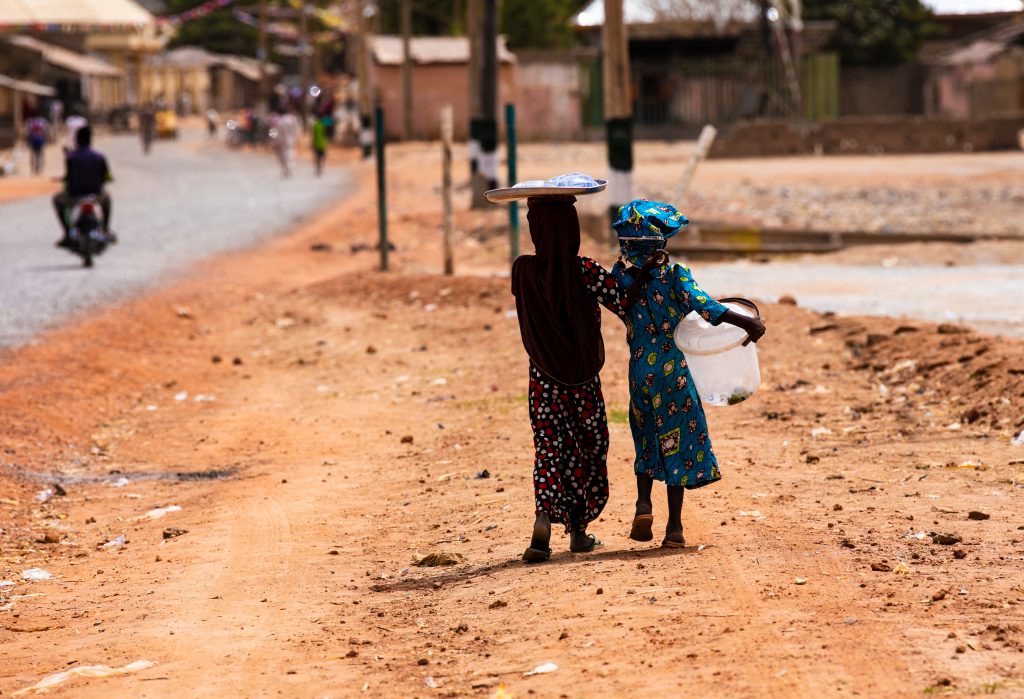
Another cause of child beggars in the northern parts of Nigeria is related to the Islamic school system and Almijarai children (children entrusted into the care of Islamic teachers from Islamic education) (Anti-Slavery International, 2020). Out of the 13 to 15 million Nigerian children not participating in formal education, 10 million are believed to be Almijarai (enrolled in the Islamic education system) and they are mainly located in the north (Anti-Slavery International, 2020). These schools centre on Islamic education and are composed of professors specialized in qur’anic and other forms of Islamic knowledge.
Sometimes considered as the better alternative to the classic education system (often too expensive for families), religious schools have also faced severe economic difficulties, sometimes leading instructors to rely on child begging as their primary source of funding (Anti-Slavery International, 2020). It must be remembered that, for centuries, religious Islamic education was well-respected.
The current situation is due to the increasing number of youths seeking support and stakeholders who prefer to “exploit the system to their own advantage” (Anti-Slavery International, 2020). There have also been reports of such practices in the northern part of the country, which has been an area of armed conflict for over a decade. Yet, beyond the conflict-affected areas, recent years have witnessed a rise in street children throughout the country (Ajakaye, 2019). These children rely on begging for food and shelter, which drastically hinders their right to food and security. This situation creates dangerous conditions for children, who are then more vulnerable to child trafficking and recruitment by armed forces.
Female genital mutilation
Female genital mutilation (FGM) refers to “all procedures involving partial or total removal of the female external genitalia or other injury to the female genital organs for non-medical reasons” (UNICEF, Statistical Profile on Female Genital Mutilation- Nigeria, 2019). FGM practices violate girls’ and women’s human rights and have been condemned by many international instruments.
FGM has a twofold impact on girls and women: in the short term, it can lead to severe pain, bleeding, inflammatory diseases, and higher risks of contracting HIV, all of which could also potentially cause death when left untreated; in the long term, FGM can lead to loss of normal sexual functions, systematic pain, infertility, mental and psychosomatic disorder, and higher risks during childbirth (World Health Organization, 2007). Therefore, FGM constitutes a violation of girls’ rights to health, security, physical integrity, freedom from cruel and degrading treatment, and life.
FGM is still deeply entrenched in Nigerian society. The prevalence of FGM practices varies significantly by State, and they are mainly centred in the south-west of the country (the States of Kwara, Oyo, Osun and Ekiti) due to ethnic reasons. Surprisingly, UNICEF found that many women whose daughters had undergone FGM are of the opinion that such practices should continue. Numerous reasons are given to justify FGM: customs, purification, aesthetic, and protection of virginity. Some also justify it to secure “increased sexual pleasure of husbands” (World Health Organization, 2007).
In the vast majority of cases, girls are cut before the age of five. There has been a transition from FGM being done by traditional healers to a more medically trained staff. The WHO expressed its concerns against such this, and stated that under no circumstances should the practice be institutionalised (TC Okeke, 2012). On the other hand, the UNICEF report shows a steady and slow decreasing trend of FGM (UNICEF, Statistical Profile on Female Genital Mutilation- Nigeria, 2019).
Written by Léa Allix
Last updated on 7 April 2021
Bibliography:
Aderinto, U. A. (2018). Social organisation and survival strategies of Nigerian children beggars in South-west Nigeria. Ibadan Journal of Sociology, Dec 8, 25.
Ajakaye, R. O. (2019, 04 12). 3500 child soldiers recruited in Nigeria: UNICEF.
Ajakaye, R. O. (2019, 05 22). Nigeria: War, poverty force children to eat off streets.
BBC. (2017, 05 08). Nigeria Chibok abductions: what we know.
Channels Television. (2018, 10 14). Child abuse: over 2 million children beg on the street in Kano.
Commission, N. N. (s.d.). Child Rights.
Compulsory Registration Act n°69/1992. (1992).
Dixon, R. (2014, 08 17). In Nigeria, child beggas are easy recruits for Boko Haram extremists.
Girls Not Brides. (2020, 02 01). Nigeria.
Itumoh, E. M. (2020, 06 26). In Nigeria, the child marriage problem needs to be but off at the root.
Nigeria Tribune, O. (2020, 03 11). Delta Government affirms commitment to protect Child’s Rights.
Obaji, P. J. (2020, 05 03). Survivors of Nigeria’s ‘baby factories’ share their stories. Al jazeera.
Okeke, U. P. (2017, 07 18). Realizing the Right to Education in Africa.
PathFinders Justice Initiative. (2020, 09 10). Nigeria: Human Trafficking Factsheet.
Prof. GED. Omuta, O. A. (2018). Infrastructure and PHC Services in Nigeria: The Case of Delta State.
RC Changani, M. G. (2001). The Child’s Right to name and nationality under Nigeria law. Journal of Indian Law Institute, n°1 March 2000.
The Federal Republic of Nigeria. (2019). Nigeria Demograhic and Health Survey 2018. DHS Program. Accessed from Demograhic and Health Survey
UNICEF. (2017). Health & HIV in Nigeria.
UNICEF. (2017). Nigeria- Education.
UNICEF. (2018). Child Marriage in West and Central Africa. UNICEF.
UNICEF. (2019). Statistical Profile on Female Genital Mutilation- Nigeria.
US Government, O. t. (2020). 2020 Trafficking in Persons Report: Nigeria. US Department of State.
World Health Organization. (2007). Elimination of Female Genital Circumcision in Nigeria.
World Health Organization. (2020). NIGERIA.
(N/A). African Charter on the Rights and Welfare of the Child.
[1] This article by no means purports to give a full or representative account of children’s rights in Nigeria. Indeed, one of the many challenges is the scant updated information, much of which is unreliable, not representative, outdated or simply non-existent.

